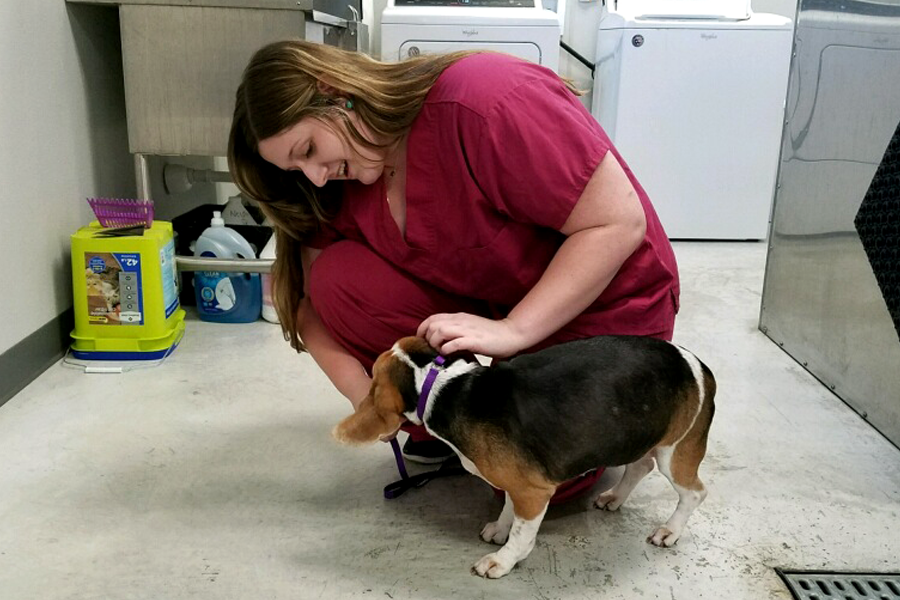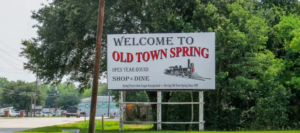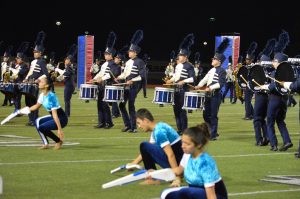Ready, Vet, Go!
Senior Elizabeth Schultz plays with one of the dogs at Cy Fair Animal Hospital, where she works 15-20 hours a week.
February 5, 2018
Every day she is surrounded by the thing she loves: animals. Between clocking in hours as an animal care technician at Cy Fair Animal Hospital and sitting through veterinary practicum, senior Elizabeth Schultz spends the last two hours of her school day off campus to further her knowledge and interest of animals. Schultz began working at Cy Fair Animal Hospital last fall.
“At the beginning of August 2017, I applied to multiple clinics, and they were the only one hiring at the time,” Schultz said. “I had to apply to Cy Fair Animal Hospital to get my job because that is a part of the veterinary program: learning how to get your own job and how to hold your job throughout the year. There are usually some vets around the Klein area that are specifically for vet practicum kids, but CFAH did not have any positions like this, so I had to physically get my job there.”
Schultz is also a member of the Veterinary Assistant program sponsored by Klein Oak.
“The Veterinary Assistant program is a program run through Klein Oak where each student is required to work 15 hours per week at a vet clinic to be able to take the Certified Veterinary Assistant Level 1 certification exam in April,” Schultz said. “To get into this program, you have to take a specific set of high school electives, take an entrance exam, go through an interview and maintain good grades and attendance throughout high school.”
According to advanced animal science teacher Nicole Brown, Schultz’s “passion for animals and hope to pursue veterinary medicine” made her a good candidate for her job at Cy Fair Animal Hospital.
“Through the Agricultural Science department here at Klein Collins, she has taken several animal science courses to provide knowledge of animal care and management,” Brown said. “She is also an active member of the Klein Collins FFA and has raised several animal projects, giving her hands-on experience in animal care.”
As an animal care technician, Schultz spends most of her time at Cy Fair Animal Hospital in the boarding area.
“The main area that I work in is the boarding area where I feed the dogs twice a day and walk them three times a day,” Schultz said. “When I’m not doing this, I’m cleaning kennels, cleaning feed bowls, doing laundry and helping throughout the clinic. I usually work with just dogs and cats, but I do have the opportunity to see unique animals when people bring them in.”
Schultz said working at Cy Fair Animal Hospital helped her “learn lots of hands-on medical techniques and experience a lot of situations that could not be taught in a classroom.”
“I have learned how to restrain animals for different medical procedures, do anal gland expression on dogs, trim nails, hold off a vein to place a catheter, restrain a dog to take blood from the cephalic vein, how to give insulin, how to remove stitches and I have witnessed and assisted during a pig castration,” Schultz said. “I feel like these techniques all have to be learned outside of a classroom. I have also learned how to act professionally with coworkers and clients, how to perform basic medical tasks and how to properly care for a variety of animals. ”
According to senior Jamie Hubbell, Schultz proves her compassion for animals outside her job through raising animal projects.
“The animal projects are through our school but rely completely on our own time and schedules,” Hubbell said. “Elizabeth currently has two pigs, a steer and some turkeys. Between work and other obligations, it can be time-consuming for her, but she knows how to [take care of her animals] and do it well enough that they make sale. It is worth the late nights and early mornings in the barn.”
Schultz plans to pursue a career as a large animal veterinarian after graduating.
“I have raised animals through FFA over the past four years of high school and have fallen in love with everything about them,” Schultz said. “I love how unpredictable large animals are, it makes each day a new experience. There is also a shortage of large animal veterinarians, so I would like to be able to help fill that need for people with large animals.”








